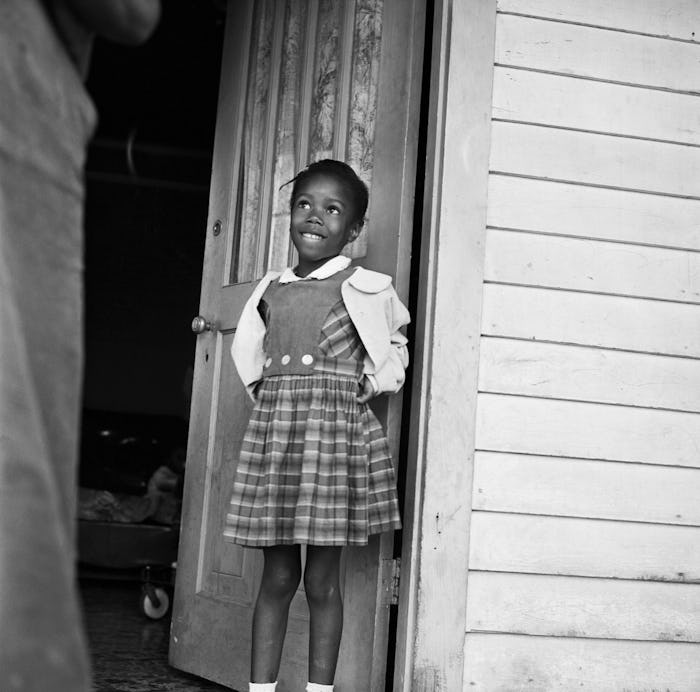OH FLORIDA...

Florida Elementary School May Ban Ruby Bridges Movie Due To (One) Parent's Complaint
The move comes after a complaint from one parent, whose children opted out of the film.
Any day in school when you got to watch an educational movie was a good day. Teachers and students alike could relax for an hour or two and learn something important. Everyone wins! But at North Shore Elementary in St. Petersburg, Florida, one such movie — the NAACP Image Award nominee Ruby Bridges — faces a district ban after a parent complained that it was inappropriate for first graders. The film tells the story of Ruby Bridges, a Black child who stood up to racist protestors to desegregate William Frantz Elementary in New Orleans in 1960.
The Tampa Bay Times reports that the film has been a staple of Black History Month instruction in Pinellas County Schools for years and, on March 2, it was shown to approximately 60 first graders at North Shore. The district’s public information officer, Isabel Macareñas, confirmed to multiple outlets that permission slips, along with a link to the trailer of the film, were sent out to families; only two opted their children out of the viewing. But for one of those parents, opting their own child out was apparently not sufficient.
NBC reports that after watching approximately the first half of the film, which originally aired unrated on ABC (it currently has a TV-PG rating), the parent lodged a complaint with the district on March 6, calling for the film’s removal from the school’s list of approved films.
Ruby Bridges has not been banned district-wide at this time. A copy is still available in the district’s movie library while under review by a committee composed of the principal, faculty, parents, community members, and a specially trained school media specialist, according to Pinellas County policy. However, Mascareñas told multiple outlets, including NBC and CNN, that the school would not have any future showing this semester as it had already been shown.
The complaint, obtained by CNN, alleges that the film teaches children racial slurs (racial slurs are used in the film) and that “White people hate Black people.” The parent also objected to a reference to lynching, which claimed the lives of at least 6,500 Black Americans from 1865 to 1950, though experts agree there are likely thousands whose deaths are undocumented as such.
This is just the latest in a string of challenged materials cases coming out of the state of Florida, which has been at the national forefront of citing “parent choice” as justification to make school curricula more conservative. It is at the heart of other initiatives to come out of the state, including the state’s so-called “Don’t Say Gay” law, banning AP African-American studies, and H.B. 1467, which is at the heart of this latest issue.
H.B. 1467, signed last year by Republican Gov. Ron DeSantis, went into effect this year. The law limits the scope of educators who were permitted to select reading materials for K-12 students, effectively banning “unvetted” books. It also requires all schools to implement a policy to address the complaints of parents and other community members in regard to any material made available in a classroom, library, or reading list.
Ruby Bridges was not the first casualty of this policy in Pinellas County; earlier this year, the district made news when it unilaterally banned Toni Morrison’s The Bluest Eye from its high schools, where it had been part of the AP English curriculum.
Common Sense Media suggests Ruby Bridges is appropriate for children 10 and older, but parent reviews on the site generally agree that younger children can get a lot from this film. Two years ago, one parent reviewer on the site specifically wrote to the value of showing the film to children in first grade
“I watched [the movie] my white first graders to continue our conversation about racism. They're fascinated with Ruby who was their age. I appreciated the attention paid to her parents' emotions and difficulty in the film. We did pause and talk about the language. I don't think that's a reason to avoid this film with younger children. ... I want them to learn and understand why racial slurs are bad and harmful from me first, not their peers.”
Speaking to CNN, Ruby Bridges screenwriter Toni Ann Johnson stated that she felt the film was indeed appropriate for first graders, noting that Bridges herself was the same age, just 6 years old, when she changed the face of American education. “If children are old enough to be called the N-word and learn what it means, then it’s my opinion that second graders who are 7 and 8 years of age can and should begin to learn about the history of racism in this country. Parents who don’t want their children to learn this story in public schools should have the right to opt out, but they should not have the right to prevent teachers from teaching the Ruby Bridges story to other children receiving a public school education.”